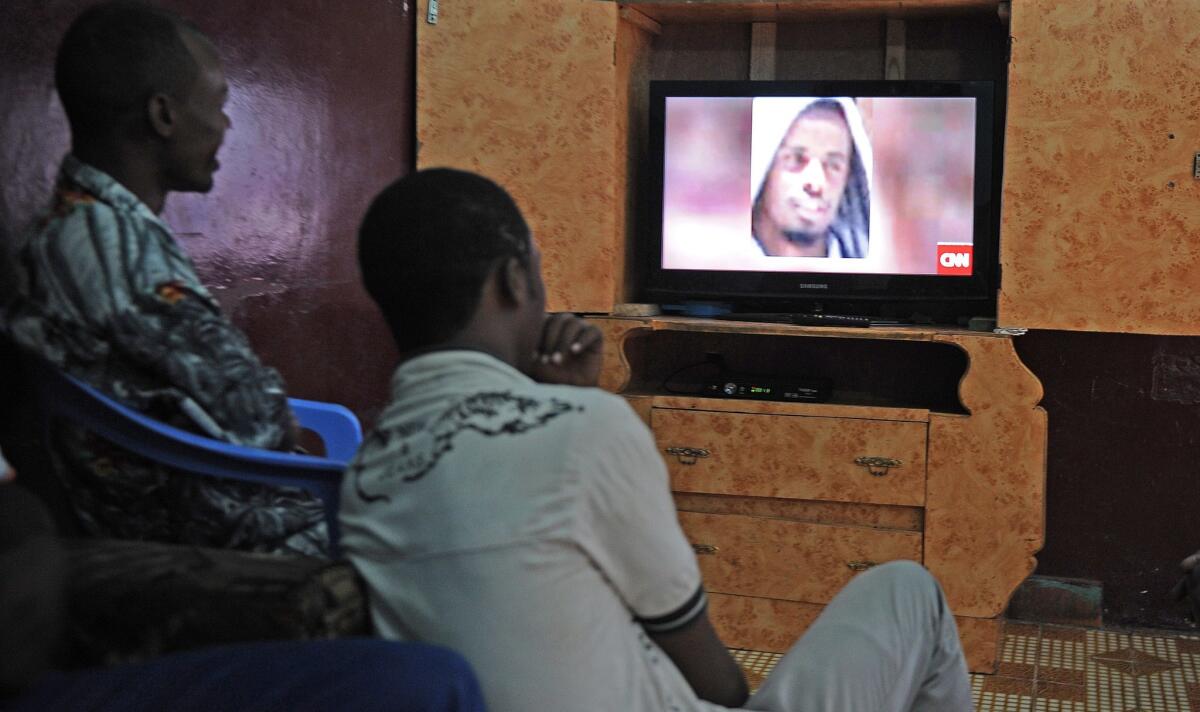Somali terrorists acknowledge death of leader, name successor

Reporting from Johannesburg, South Africa — The Somali terrorist group Shabab on Saturday confirmed the death of its leader, Ahmed Abdi Godane, in an American airstrike early in the week and announced that it had chosen a new leader reportedly from among his small circle of remaining allies.
The statement from the organization named Abu Ubeid Omar as the new chief and affirmed the group’s loyalty to Al Qaeda.
Godane, the shadowy and tyrannical figure who ruled the Shabab with an iron first, terrified not only ordinary Somalis but members of his own organization. He killed so many of his rivals that he left the group with no obvious successor when he died, analysts said.
He concentrated power in his hands, ran secret jails for accused traitors and ordered the deaths of Shabab commanders who criticized him. Under Godane’s leadership, Shabab beheaded and shot Somali boys who refused to fight, carried out stonings and amputations and blocked access to Western humanitarian agencies during the 2011 famine.
Shabab’s most notorious attack under Godane’s leadership came last year when a small number of fighters armed with automatic weapons seized the upscale Westgate shopping mall in Nairobi, Kenya, for several days, killing at least 67 people.
Shabab acknowledged Saturday what U.S. officials had reported the day before: that Godane, 37, was killed in the same way his predecessor, Aden Hashi Ayro, who died in a 2008 airstrike. The statement said two other Shabab colleagues were killed in the attack this week, although a Shabab commander told the Associated Press on Friday that six Shabab figures were killed.
Godane had been paranoid about his survival and took precautions to avoid Ayro’s fate. He shunned videos and photographs, rarely interacted with anyone outside the group’s small leadership circle and trusted only a few loyal aides. He issued statements through audio recordings and reportedly avoided traveling by convoy for fear of U.S. drones.
Yet he was traveling in a convoy of several vehicles Monday after meeting with other Shabab leaders when the airstrike occurred.
Shabab’s statement warned that its attacks will “only grow in strength and ferocity,” adding that “avenging the death of our scholars and leaders is a binding obligation on our shoulders that we will never relinquish nor forget no matter how long it takes.”
But analysts said Shabab was probably severely weakened by the death of a leader who had so centralized power.
Shabab, which is fighting to dislodge Somalia’s fragile government, lost territory and popular support under Godane’s rule. Many Somalis came to loathe the group, which had carried out bombings in the capital, Mogadishu, often with high numbers of civilian casualties.
Godane’s death could usher in a power struggle between factions that could leave Shabab further weakened and fragmented, said Stig Jarle Hansen, author of a 2013 book, “Al Shabab in Somalia: The History and Ideology of a Militant Islamist Group.”
“It’s a blow to Al Shabab because the power inside Al Shabab is concentrated around Godane,” Hansen said. “It’s also a heavy blow because of the group’s military defeats recently. It’s a time when the group needs internal order for battle. This will disturb their men at the top. Their central leader, in this crucial time, is gone.”
“There might be some internal power struggles that could further weaken Al Shabab,” he said. “The frequency of its attacks could go down.”
But Hansen said there are some other “scary scenarios – that Al Shabab is weakened so much that its [foreign] fighters go home, leading to attacks outside Somalia.” Migrating fighters could set up terrorist cells in Kenya, elsewhere in East Africa and even the West, posing new threats, he said.
Kenyan affiliates of the Shabab, which have carried out recent attacks along that nation’s Indian Ocean coast, weren’t directly under Godane’s control and would probably continue to operate, Hansen predicted.
Godane, devout and reclusive, reportedly loved writing poetry. He studied in Pakistan and was believed to have been trained by the Taliban in Afghanistan. In 2012, the U.S. put a $7-million bounty on Godane’s head.
Omar Hammami, an American also known as Abu Mansour al-Amriki who joined Shabab, offered a rare glimpse of the terror inside the group.
Shortly before Godane’s men killed him in September 2013, the American tweeted that the Shabab leader was a “control freak” who had “gone mad” and who wiped out anyone who disagreed with him.
Godane, who co-founded Shabab, had another founder, Ibrahim Haji Jama Mead, killed for posting a letter on the Internet to Al Qaeda leader Ayman Zawahiri in April 2013 criticizing Godane’s tyrannical approach for jailing Shabab foreign fighters.
He complained that Shabab had lost territory and support because of Godane’s “internal deviation” and accused him of oppressing Muslims, crushing talented recruits, throwing fighters into secret jails and undermining the jihad spirit.
Another Shabab leader who defied Godane was killed, while others fled.
In a bid to split off the less extreme factions in Shabab, the Somali government Wednesday offered an amnesty to fighters who give up their struggle against the government.
“I think it’s a very wise move,” Hansen said. “There are some Al Shabab commanders who have a tendency to independence and it’s worth trying to split them off by implementing an amnesty.”
At best, Godane’s death could be a small step toward a more stable and peaceful Somalia, he added. “This hope is still a long way off but it does appear to be a little bit closer.”
Follow @robyndixon on Twitter for news out of Africa
More to Read
Sign up for Essential California
The most important California stories and recommendations in your inbox every morning.
You may occasionally receive promotional content from the Los Angeles Times.










